138 posts
Latest Posts by writersreferencez - Page 3
25 hot traits for your character :
(feel free to use <3 yall gotta agree with me on the 10th, 11th, 12th and from 17th to 21st cus :) tag me yall )
they hold eye contact whenever you talk
they love when you wear their clothes. [hehe]
they get physically clingy whenever they're jealous [ holy god]
always pulls you into a random embrace.
they manspread alot with a sultry gaze >> [imagine that gaze and that fucking smirk]
likes to tease you a lott
or easily blushes when you teach them ♡
holding gazes while kissing your body [highway looks mad comfyy rn]
"look at me when I'm making you feel good, baby" *coughing violently*
vocally expressive, isn't afraid of moaning loud > <
loves keeping you close to them
"if you ask me to fucking kneel, then I would, my love."
clicking their tongue against their cheek when they're mad or jealous !!!!!
kissable lips. sultry gaze, seductive smirk. [weak in em knees fr]
"say that again, mi sol."
loves to showcase you.
always has the top button of their shirt open [banging my head aaaaa]
slightly biting their lower lip when they smile
rolls their tongue over their lips often
sexy fingers !!!!
baby face, raspy and deep voice > \\ <
knows the effects of their actions over you [ do yk my last name?? its *yours* ;) ]
smells good 24/7
multilingual. (now tell me yall dont find multilingual people hot af-)
skilled. an all-rounder irl. smart and skilled, can easily save the world singlehandedly fr
1930’s Slang Reference
I just thought I’d whip this up for any rp'ers who might find it useful :)
Abercrombie- a know it all
All wet- no good
Aces, snazzy, nobby, smooth, swell, keen- very good
Ameche, horn, blower- telephone
Babe, broad, dame, doll, frail, twist, muffin, kitten- names for women
Bean shooter, gat, rod, roscoe, heater, convincer- gun
Beat- broke
Bleed- to blackmail
Blow your wig- become very excited
Booze, hooch, giggle juice, mule- whiskey
Brodie- a mistake
Bulge- advantage
Bumping gums, booshwash- talking about nothing useful
Cabbage, lettuce, kale, folding green, long green, Suds, salad, dough, moolah, rhino- money
Cave- one’s home
Chisel- swindle or cheat
Clip joint- Night club or gambling joint where patrons get screwed
Crumb, fink- loser
Crust- to insult
Curve- a disappointment
Dig- think hard or understand
Doggy- well dressed but in a self concious way
Doss- sleep
Drilling, plugging, throwing lead, filling someone with daylight, giving someone lead poisoning- shooting at someone
Grifter- con man or woman
Make tracks, dangle- leave quickly
Packing heat, wearing iron- carrying a gun
Shake a leg- hurry up
Snipe- cigarette
Togged to the bricks- dressed up
Take a powder, blow, split, scram, drift- leave
Trip for biscuits- a pointless task
Twit- fool or idiot
helpful sites for writers
i have a little collection of websites i tend to use for coming up with ideas, naming people or places, keeping clear visuals or logistics, writing basics about places i've never been to, and so on. i tend to do a lot of research, but sometimes you just need quick references, right? so i thought i'd share some of them!
Behind the Name; good for name meanings but also just random name ideas, regardless of meanings.
Fantasy Name Generator; this link goes to the town name generator, which i use most, but there are lots of silly/fun/good inspo generators on there!
Age Calculator; for remembering how old characters are in Y month in Z year. i use this constantly.
Height Comparison; i love this for the height visuals; does character A come up to character B's shoulder? are they a head taller? what does that look like, height-wise? the chart feature is great!
Child Development Guide; what can a (neurotypical, average) 5-year-old do at that age? this is a super handy quickguide for that, with the obviously huge caveat that children develop at different paces and this is not comprehensive or accurate for every child ever. i like it as a starting point, though!
Weather Spark; good for average temperatures and weather checking!
Green's Dictionary of Slang; good for looking up "would x say this?" or "what does this phrase mean in this context?" i love the timeline because it shows when the phrase was historically in use. this is english only, though; i dig a little harder for resources like this in other languages.
helpful sites for writers
i have a little collection of websites i tend to use for coming up with ideas, naming people or places, keeping clear visuals or logistics, writing basics about places i've never been to, and so on. i tend to do a lot of research, but sometimes you just need quick references, right? so i thought i'd share some of them!
Behind the Name; good for name meanings but also just random name ideas, regardless of meanings.
Fantasy Name Generator; this link goes to the town name generator, which i use most, but there are lots of silly/fun/good inspo generators on there!
Age Calculator; for remembering how old characters are in Y month in Z year. i use this constantly.
Height Comparison; i love this for the height visuals; does character A come up to character B's shoulder? are they a head taller? what does that look like, height-wise? the chart feature is great!
Child Development Guide; what can a (neurotypical, average) 5-year-old do at that age? this is a super handy quickguide for that, with the obviously huge caveat that children develop at different paces and this is not comprehensive or accurate for every child ever. i like it as a starting point, though!
Weather Spark; good for average temperatures and weather checking!
Green's Dictionary of Slang; good for looking up "would x say this?" or "what does this phrase mean in this context?" i love the timeline because it shows when the phrase was historically in use. this is english only, though; i dig a little harder for resources like this in other languages.
How to Write Betrayal
Betrayal is a powerful plot element that is represented in countless stories. The gravity of betrayal brings a profound depth to character dynamics, plots, and themes alike, making it an indispensable tool for writers to explore emotions, conflicts, and the complexities of human nature. Let’s explore some quick tips on how to write betrayal!
Behaviour
Secretive actions
Dishonesty
Becoming emotionally distant
A sudden change in routine
Pushing people away
Nervous or fidgety movement
Frequent lying or making up stories
Unexpected aggression or irritability
Unjustified mood swings or emotional outbursts
Increasingly defensive
Interactions
Disturbed interpersonal relationships
Frequent misunderstandings or fights
Withholding information
Avoiding personal discussions
Insincerity in conversations
Frequently cancelling or missing plans
A sudden shift in relationship dynamics
Quick to deflect or place blame
Frequent subject changes
Gradual emotional detachment
Body Language
Avoiding direct eye contact
Defensive stance and crossed arms
Covering mouth or touching face
Shuffling or restless movements
Forcing smiles or laughter
Constantly looking around or at the ground
Stiff, tense posture
Heavy breathing or frequent sighing
Avoiding touch or skin contact
Exaggerated gestures
Attitude
A lack of concern or empathy
Increasingly personal and hurtful arguments
Erratic or unpredictable reactions
Self-centeredness
Insincerity
Dismissive or negative attitude
Callous disregard for other's feelings
A negative or pessimistic outlook
Inability to handle criticism
Withdrawal from relationships
Positive Story Outcomes
In the wake of a betrayal, a story can manifest various positive outcomes that add depth to the plot and its characters. Relationships can be strengthened, showing their resilience. Characters may discover newfound self-reliance and learn valuable lessons about trust and forgiveness, leading to an increase in empathy and understanding, personal growth, and the reinforcement of personal values. These experiences can encourage a clearer understanding of personal boundaries, prompt self-reflection, introspection, and the development of healthier coping mechanisms. Ultimately, these positive outcomes can bring about improved communication and honesty, forming the silver lining in the cloud of betrayal.
Negative Story Outcomes
The aftershocks of betrayal can reverberate throughout your story. This might include an irreparable fracture of trust and damage to relationships. Betrayal can trigger psychological trauma, leading to an increase in suspicion and insecurity. Feelings of inadequacy or self-blame may surface, and characters can experience a heightened sense of isolation. The fear of forming new relationships or trusting others can become overwhelming. There may also be an escalation of conflict or violence and the reinforcement of negative behaviours or patterns. Damaged self-esteem or self-worth may be another repercussion, and this can encourage destructive coping mechanisms.
Helpful Synonyms
Treachery
Deception
Double-crossing
Duplicity
Backstabbing
Two-faced
Disloyalty
Unfaithfulness
Infidelity
Falseness
Perfidy
Treason
Fraud
Deceit
Slander
Misrepresentation
Falsification
Chicanery
Double-dealing
diferent ways to describe the fear of something?
Different Ways to Describe Fear
Symptoms of Fear:
accelerated breathing
accelerated heart rate
goosebumps
sweating
sleep disturbance
butterflies in stomach
dizziness
Body Language Responses to Fear:
hunching shoulders
shrinking away
wide eyes
shaking / trembling
freezing
wrapping arms around themselves
shaking hands
Writing Prompts:
-> feel free to edit and adjust pronouns as you see fit.
She pressed a trembling hand to her chest as if that would do anything to slow her racing heart.
His eyes were crazed, darting around to look at the shadows of the room.
Their limbs felt like jelly, afraid that they would collapse at any moment.
She was utterly frozen. Her body cut all communication with her mind, and no matter how much her brain screamed for her to run she was immobilized in terror.
He had a tight knot forming in his stomach.
They couldn't breathe. They were totally suffocated by fear and it felt like a heavy weight was pressing down on their chest.
Dread clouded her thinking. She walked around like she was in a daze, relying solely on muscle memory to get her down the hallway.
His hands were trembling so badly that he couldn't do anything and his terror made it impossible to focus.
Their throat was dry. No matter how many times they swallowed it did nothing to relieve the uncomfortable feeling.
The salty taste of fear lingered on her lips.
His muscles screamed at him to leave, but he couldn't bring himself to move. He stared forwards hauntingly.
They ran. They ran faster than their legs had ever carried them, adrenaline taking over all of their senses. It felt like they were being chased, but there was no way for them to know for certain. They were too afraid to turn around.
It felt like her heart was about to burst from her ribcage.
Some of my favorite words and phrases to describe a character in pain
coiling (up in a ball, in on themselves, against something, etc)
panting (there’s a slew of adjectives you can put after this, my favorites are shakily, weakly, etc)
keeling over (synonyms are words like collapsing, which is equally as good but overused in media)
trembling/shivering (additional adjectives could be violently, uncontrollably, etc)
sobbing (weeping is a synonym but i’ve never liked that word. also love using sob by itself, as a noun, like “he let out a quiet sob”)
whimpering (love hitting the wips with this word when a character is weak, especially when the pain is subsiding. also love using it for nightmares/attacks and things like that)
clinging (to someone or something, maybe even to themselves or their own clothes)
writhing/thrashing (maybe someone’s holding them down, or maybe they’re in bed alone)
crying (not actual tears. cry as in a shrill, sudden shout)
dazed (usually after the pain has subsided, or when adrenaline is still flowing)
wincing (probably overused but i love this word. synonym could be grimacing)
doubling-over (kinda close to keeling over but they don’t actually hit the ground, just kinda fold in on themselves)
heaving (i like to use it for describing the way someone’s breathing, ex. “heaving breaths” but can also be used for the nasty stuff like dry heaving or vomiting)
gasping/sucking/drawing in a breath (or any other words and phrases that mean a sharp intake of breath, that shite is gold)
murmuring/muttering/whispering (or other quiet forms of speaking after enduring intense pain)
hiccuping/spluttering/sniffling (words that generally imply crying without saying crying. the word crying is used so much it kinda loses its appeal, that’s why i like to mix other words like these in)
stuttering (or other general terms that show an impaired ability to speak — when someone’s in intense pain, it gets hard to talk)
staggering/stumbling (there is a difference between pain that makes you not want to stand, and pain that makes it impossible to stand. explore that!)
recoiling/shrinking away (from either the threat or someone trying to help)
pleading/begging (again, to the threat, someone trying to help, or just begging the pain to stop)
Feel free to add your favorites or most used in the comments/reblogs!
A brief guide on how to punctuate dialogue
Punctuation in dialogue is one of the easiest things to get wrong in writing, and, frustratingly, it can be hard to find decent teaching resources. So if you’re struggling to tell whether to use a comma or a period, this guide is for you.
1) Every time a new character speaks, the first line of their dialogue must be set apart by a paragraph break.
Right:
“I think Jeff Bezos might be a lizard,” said Bo.
“Not this again,” I replied.
Wrong:
“I think Jeff Bezos might be a lizard,” said Bo. “Not this again,” I replied.
2) Only direct dialogue needs quotation marks. Direct dialogue is used when someone is speaking. Indirect dialogue is a summary of what was said.
Direct:
“Come on, Jeff, get ‘em!”
Indirect:
He told Jeff to go get ‘em.
3) Punctuation always goes inside quotation marks.
Right:
“What would you prefer?”
“A goat cheese salad.”
Wrong:
“What would you prefer”?
“A goat cheese salad”.
4) If you follow or start a quote with a dialogue tag, you end the quote with a comma.
Right:
“Welcome to the internet,” he said.
She asked, “Can I look around?”
Wrong:
“Welcome to the internet.” He said.
She asked. “Can I look around?”
5) But, if you follow or start a quote with an action, you use a period.
Right:
“Welcome to the internet.” He smiled.
Her eyes flicked to the screen. “Can I look around?”
Wrong:
“Welcome to the internet,” he smiled.
Her eyes flicked to the screen, “Can I look around?”
6) When breaking up dialogue with a tag, use two commas. Or, if the first piece of dialogue is a complete sentence, use a comma and then a period.
“Yes,” he replied, “an avocado.” (split sentence)
“I hoped it wouldn’t come to this,” she said. “I loved that avocado.” (full sentence)
7) You may have noticed there are two different quotation marks ( ‘ and “). And when putting a quote inside a quote, you need to use the opposite style of quotation.
Roger looked up. “And then he said, ‘I didn’t steal the avocado.’”
Or:
Roger looked up. ‘And then he said, “I didn’t steal the avocado.”’
(Using ‘ or “ often depends on personal choice. Although Brits like to use ‘ and Americans tend to use “ for their main dialogue)
So that’s my short guide to the main rules when punctuating dialogue! If you have any questions about less common rules, let me know.
How to Use an Ellipsis Properly in Fiction
Ever wonder why some ellipses seem to have three dots and others have four? Some have spaces between each dot and some don’t? Why sometimes you capitalize after an ellipsis and other times you lowercase?
To be honest, I don’t think most of us were taught properly how to use an ellipsis. I know I wasn’t. I see a lot of writers who don’t understand all the rules of ellipses either.

Some of you may be wondering what an “ellipsis” is. It’s a fancy name for the three dots or “periods” you see in writing ( … ). The word “ellipsis” is Greek for “omission,” which is what it does. It shows that something has been omitted or left out.
Now with research papers, this might be obvious. Maybe you are quoting a source and don’t want to quote every single word of it, so you use an ellipsis to show that you left some stuff out. Like this:
Full quote:
“You know you’re in love when you can’t fall asleep because reality is finally better than your dreams.” - Dr. Suess
Quote with omission:
“You know you’re in love when … reality is finally better than your dreams.” - Dr. Suess
In fiction, we usually aren’t quoting sources. But the ellipsis works in similar ways, it conveys that something is omitted. This might be something directly omitted. Mamma Mia uses this method well:
July seventeenth, what a night. Sam rowed me over to the little island. We danced on the beach, and we kissed on the beach, and …
The ellipsis is used to imply they got intimate, but that part is “omitted.”
Other times things are omitted because they are incomplete–maybe an incomplete line of dialogue such as when a character trails off.
“I started to go to the school, but …” she trailed off.
Or an incomplete thought.
Would she actually want … ? she wondered.
Or maybe something is “omitted” for the sake of something else, like a character trying to censor or tone down his word choice.
“Sarah is really very … fanciful, isn’t she?” David said.
In pauses like this, the ellipsis may convey thinking. It’s completely fine to use them that way.
In rare occasions, an ellipsis might be used to indirectly convey the passing of time.
She ate … she drank … and she went shopping.
And you may occasionally see them used other ways stylistically, but these are the main situations.
In a sense, though, in all these examples, something is omitted, whether it’s directly, or indirectly, like an incomplete or changing thought, or actions in between.
When used smartly, ellipses can be powerful in fiction because they convey more than what is on the page, and that is vital to good storytelling.
Too often, however, newer writers just throw them in because they like the feel and sound of them or the long pause, or even in some cases … because they are lazy. Make sure if you use them, they have a point.
Now let’s get to the technicalities. Years ago, I used to be confused that sometimes ellipses seemed to be three dots and other times four, and I didn’t know when to use which. Ellipses are three dots. However, if it comes after a complete sentence, you still use a period.
I was so hungry… . chicken, cereal, tofu, pasta–all of it sounded good.
If it follows an incomplete sentence, you don’t use a period.
“You know you’re in love when … reality is finally better than your dreams.” - Dr. Suess
If the words after the ellipsis are the start of a new sentence, you capitalize them.
"They treated me like … Want to go to dinner?“ she asked suddenly.
If not, you don’t.
When it comes to spacing before and after an ellipsis, handle it how you would a regular word.
Sarah was really very[space]…[space]fanciful.
“I started to go to the school, but[space] …[no space]” she trailed off.
One exception to this is if there is a question mark following.
Would she actually want[space]…[space]? she wondered.
According to The Chicago Manual of Style, ellipses should have a space between each dot.
Would she actually want[space].[space].[space].[space]? she wondered.
However, in APA style, there are no spaces between dots.
Would she actually want … ? she wondered.
Fiction typically follows The Chicago Manual of Style, but you may still see the ellipsis with no spaces, especially since word processors sometimes reformat ellipses automatically. So while technically they should have spaces between each dot, you probably aren’t going to get reprimanded if you don’t. Even The Chicago Manual of Style notes that some places will be fine with the no-space ellipsis. I use spaces because that’s how I was corrected by a mentor once.
One more thing: Ellipses do not signify an interruption.
WRONG:
“I wish …”
“Shut up!” Mike interrupted.
Use em dashes for that.
Correct:
“I wish–”
“Shut up!” Mike interrupted.
Dashes are another subject.
But hopefully now you know how to handle ellipses!
hey writers! OneLook Thesaurus lets you find that word you can’t think of but can describe! go check it out!



One of the best tips for writing descriptions of pain is actually a snippet I remember from a story where a character is given a host of colored pencils and asked to draw an egg.
The character says that there’s no white pencil. But you don’t need a white pencil to draw a white egg. We already know the egg is white. What we need to draw is the luminance of the yellow lamp and the reflection of the blue cloth and the shadows and the shading.
We know a broken bone hurts. We know a knife wound hurts. We know grief hurts. Show us what else it does.
You don’t need to describe the character in pain. You need to describe how the pain affects the character - how they’re unable to move, how they’re sweating, how they’re cold, how their muscles ache and their fingers tremble and their eyes prickle.
Draw around the egg. Write around the pain. And we will all be able to see the finished product.
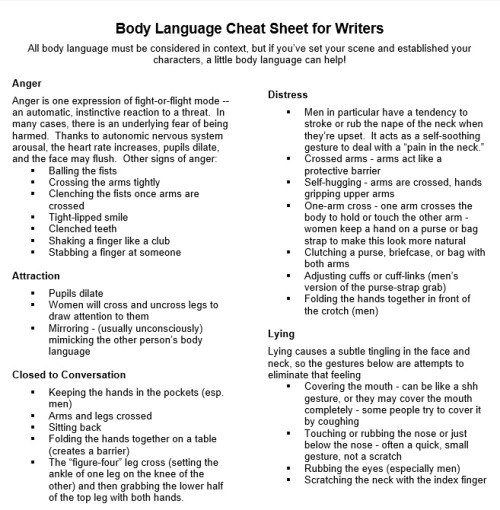

Body Language Cheat Sheet for Writers
As described by Selnick’s article:
Author and doctor of clinical psychology Carolyn Kaufman has released a one-page body language cheat sheet of psychological “tells” (PDF link) fiction writers can use to dress their characters.
site that you can type in the definition of a word and get the word
site for when you can only remember part of a word/its definition
site that gives you words that rhyme with a word
site that gives you synonyms and antonyms

More bits of writing discussion
I don't know how accurate some of these are, but they can be useful

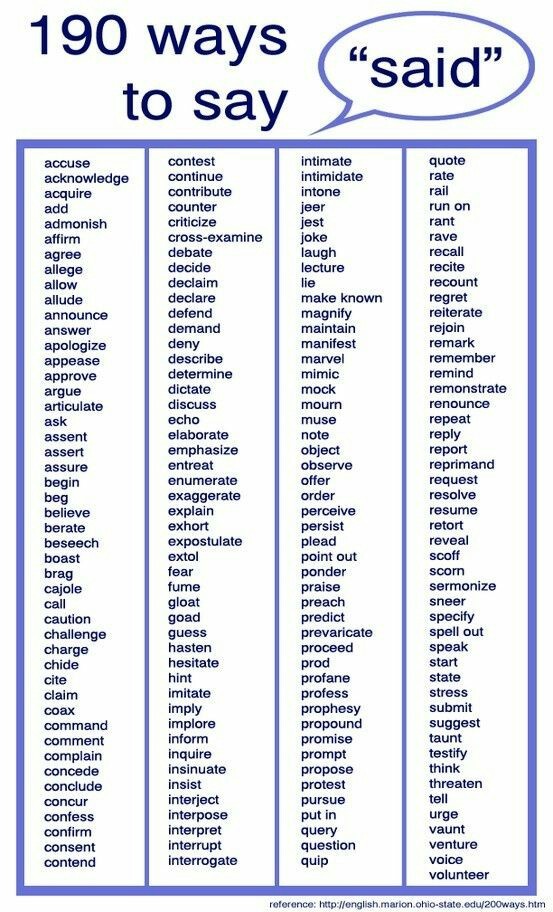



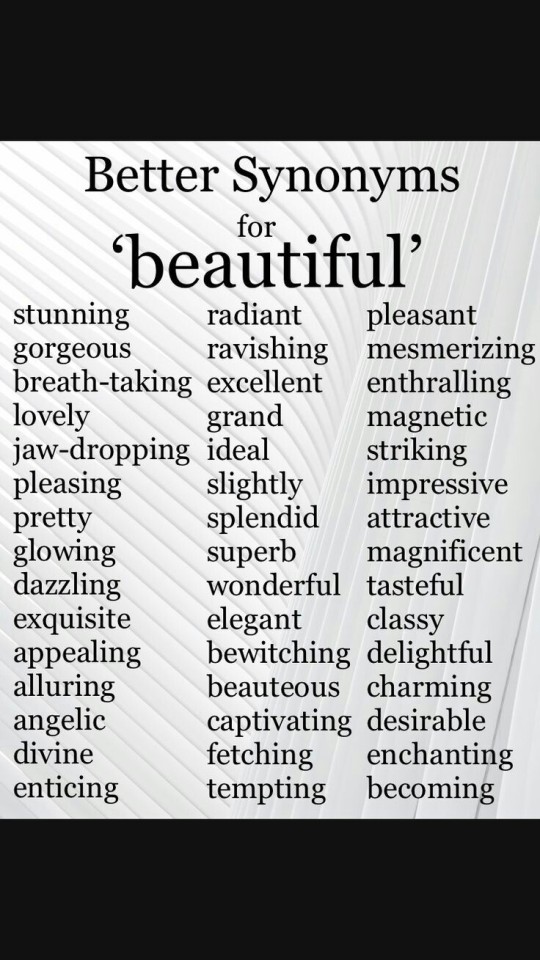

Writing Research & Google
Google is your friend when it comes to writing research. You can become even better friends when you use these tips to focus your search results!
See chart above (source: ultralinx) or the transcribe below:
Quotation Marks - Use quotes to search for an exact word or set of words.
Example: “To be or not to be”
Dashes - Put a dash before a word that you want to exclude in your search
Example: jaguar -animal
Tilde - Use a tilde before a term to include results with its synonyms
Example: Christmas ~desserts
Site:Query - Search within a specific web page
Example: site:nytimes.com
Link:Query - Search for sites that link to a specified site url
Example: link:creattica.com
Two Periods - Use two periods between two numbers to express range of things like dates, measurements, and prices
Example: movies 1950..1970
Related:Query - Use to find sites that are related to the specified site.
Example: related:appstorm.net
Symbolism
I thought I might not be the only writer out there who likes to put symbolism in their stories so I found some things and what they represent!!
Animals
Alligator - stealth, survival
Ant - diligence, industry, community, remarkable strength, hard working, success, patience
Antelope - action
Armadillo - boundaries, self protection
Badger - aggressiveness, passion and drive
Bat - rebirth, longevity, joy, good luck
Bear - gentle strength, dreaming, introspection, power, protection
Beaver - builder, accomplishing goals
Bee - divine messenger, love, service, gathering, community
Bird - enlightenment, perspective, swiftness, vision, prophetic knowledge
Boar - nature-based wealth, prosperity, success, protection, courage
Buffalo - prayer, abundance, survival needs met, good fortune, healing
Bulls’ horns - a good symbol in meditation for motivation
Butterfly - rebirth, the soul, transformation, the three phases of life
Cat - feminine energy, mystical power, used to keep the wearer safe in travel, wholeness
Chameleons - ever-changing future, inconsistency
Cheetah - speed, focus
Cougar - power, swiftness, balance
Cows - red cows are a symbol of hope, inspiring symbol for nurturing efforts
Coyote - trickster
Crane - longevity. A pair of cranes symbolizes “Long Marriage”
Cricket - good luck charm, singing, Spring, fertility
Crow - sacred law, gateway to supernatural, shape shifting, illusion
Deer - graceful gentleness, sensitivity, compassion, kindness
Dog - companionship, health, service, loyalty, protection, future prosperity
Dolphin - manna, joy, childlike play, helpfulness, breath of life, harmony, intelligence, self connection
Donkey - fertility, easy childbirth, efficiency, health, well-being, and luck
Dove - peace, innocence, fidelity, love, gentleness, kindnes
Dragonfly - good fortune, magic, vision, dreams, luck, and ancient knowledge, illusion
Dragon - wisdom due to long lives and potent magic, royalty, Emperor, eternity, courage, strength, rain, Spring
Eagle - courage, spirit, bravery, strength
Elephant - commitment, strength, astuteness
Elk - stamina, pride, power, majesty
Fish - miracles, providence, sea/water magic, good luck and prosperity, foresight, fortune, salmon in particular, are associated with knowledge
Fox - camouflage, adaptability, integration, tricksters, shape shifters, and possessors of great magic
Frog - healing, cleansing, messages, health, honesty, fluidity, purification
Gazelle - awareness
Giraffe - grounded vision
Goat - tenacity, diligence, can help to achieve goals, endure criticism, and stay safe. Goat’s fur or foot - an anti-evil talisman.
Goose - safe return, love of home
Grasshopper - nobility, prosperity
Hawk - nessenger, strength, foresight, truth
Hippopotamus - emotional depths
Horses - power, stamina, speed, transportation and communication - A black horse with a white marking on its forehead is lucky
Hummingbird - joy, pure love, celebration of life
Ladybug - delight, trust
Lamb - filial piety (dutiful respect or regard for parents).
Lion (baby) cubs - inspire mercy and gentleness.
Lion (grown) - inspire strength, courage
Lions - pride, nobility, cunning, courage, just laws, fairness, the sun, images can protect sacred ground.
Lizard - dreaming, foresight, ancient secrets
Lynx - secrets
Monkey - benevolence, drives away evil
Moose - self-esteem, assertiveness
Mountain Lion - wisdom, leadership
Mouse - frugality, rebirth, scrutiny
Opossum - strategy, diversion
Otter - medicine (woman), balanced feminine energy
Owl - deception, wisdom, clairvoyance, magic
Ox - evil spirits that disturb lakes, rivers, and seas
Peacock - wholeness, dignity, beauty, recognition, self assurance, pride
Pig - rebirth and rejuvenation
Porcupine - innocence
Rabbit - fear, fertility, moon magic, speed, swiftness, longevity, courage, strength
Raccoon - dexterity, disguise
Raven - magic
Robin - growth, renewal
Rooster - courageous, warlike disposition, warmth and life of the Universe
Scorpion - the “fire within” that often needs careful tending
Seal - inner voice
Sheep - sacrifice
Snake - cunning, evil, supernatural power
Spider - destiny, fate, weaving
Squirrel - gathering
Swan - grace
Tiger - courage, bravery, fierceness, strength, being in the now
Turtle - mother earth
Weasel - stealth
Whale - record keeper
Wolf - teacher, A Guide to the Sacred
Zebra - Individuality
PLANTS
Aloe- Healing, protection, affection
Amaryllis- Pride
Anemone- Forsaken
Angelica- Inspiration
Apple blossom- Preference
Arborvitae- Unchanging friendship
Aster- Symbol of Love, Daintiness
Basil- Good wishes
Bay- Glory
Begonia- Beware
Bittersweet- Truth
Black-eyed Susan- Justice
Bluebell- Humility, kindness
Candytuft- Indifference
Red carnation- My Heart Aches, admiration
- White carnation- Innocence, pure love, women’s good luck gift
- Pink carnation- I’ll never forget you
- Yellow carnation- Disdain, disappointment, rejection
Chamomile- Patience
Chives- Usefulness
Chrysanthemum- Cheerfulness
Clover, white- Think of me
Coreopsis- Always cheerful
Coriander- Hidden worth
Crocus- spring, Youthful gladness
Cumin- Fidelity
Cyclamen- Resignation and good-bye
Daffodil- Regard
Daisy- Innocence, hope
Dill- Powerful against evil
Edelweiss- Courage, devotion
Fennel- Flattery
Fern- Sincerity
Forget-me-not- True love memories
Gardenia- Secret love
Geranium- oak-leavedTrue friendship
Gladiolus- Remembrance
Goldenrod- Encouragement, good fortune
Heliotrope- Eternal love
Holly- Hope
Hollyhock- Ambition
Honeysuckle- Bonds of love
Horehound- Health
Hyacinth- Games and sport, playfulness, rashness
– Blue Hyacinth- Constancy of love
– Purple Hyacinth- Sorrow, forgiveness, regret
– Yellow Hyacinth- Jealousy
– White Hyacinth- Loveliness, prayers for someone
Hydrangea- Gratitude for being understood; frigidity and heartlessness
Hyssop- Sacrifice, cleanliness
Iris- A message
Ivy- Friendship, continuity
Jasmine- white- Sweet love
Lady’s-mantle- Comforting
Lavender- Devotion, virtue
Lemon balm- Sympathy
Lilac- Joy of youth
Lily, calla- Beauty
Lily, day- Chinese emblem for mother
Lily-of-the-valley- Sweetness, purity
Lotus Flower- Purity, enlightenment, self-regeneration, and rebirth
Magnolia- Love of nature
Marjoram- Joy and happiness
Mint- Virtue
Morning glory- Affection
Myrtle- Good luck and love in a marriage
Nasturtium- Patriotism
Oak- Strength
Oregano- Substance
Pansy- Thoughts
Parsley- Festivity
Peony- Bashful, happy life
Pine- Humility
Poppy, red- Consolation
Rhododendron- Danger, flee
Rose, red- Love, I love you.
Rose, dark crimson- Mourning
Rose, pink- Happiness
Rose, white- Purity, heavenly, I’m worthy of you
Rose, yellow- Jealousy, decrease of love
Rosemary- Remembrance
Rue- Grace, clear vision
Sage- Wisdom, immortality
Salvia, blue- I think of you
Salvia, red- Forever mine
Savory Spice- interest
Sorrel- Affection
Southernwood- Constancy, jest
Sunflower- Adoration
Sweet pea- Pleasures
Sweet William- Gallantry
Sweet woodruff- Humility
Tansy- Hostile thoughts
Tarragon- Lasting interest
Thyme- Courage, strength
Tulip, red- Passion, declaration of love
Tulip, yellow- Sunshine in your smile
Valerian- Readiness
Violet- Loyalty, devotion, faithfulness, modesty
Wallflower- Faithfulness in adversity
Willow- Sadness
Yarrow- Everlasting love
Zinnia- Thoughts of absent friends
Color
Red: Excitement, energy, passion, love, desire, speed, strength, power, heat, aggression, danger, fire, blood, war, violence, all things intense and passionate, sincerity, happiness (Only in Japan)
Pink: love and romance, caring, tenderness, acceptance and calm.
Beige and ivory: symbolize unification.
Ivory: symbolizes quiet and pleasantness.
Beige: calm and simplicity.
Yellow: signifies joy, happiness, betrayal, optimism, idealism, imagination, hope, sunshine, summer, gold, philosophy, dishonesty, cowardice, jealousy, covetousness, deceit, illness, hazard and friendship.
Dark Blue: Symbolizes integrity, knowledge, power, and seriousness.
Blue: Peace, tranquility, cold, calm, stability, harmony, unity, trust, truth, confidence, conservatism, security, cleanliness, order, loyalty, sky, water, technology, depression, appetite suppressant.
Turquoise: calm.
Teal: sophistication.
Aquamarine: symbolizes water.
Lighter turquoise: a feminine appeal.
Purple: Royalty, nobility, spirituality, ceremony, mysterious, transformation, wisdom, enlightenment, cruelty, honor, arrogance, mourning, temperance.
Lavender: femininity, grace and elegance.
Orange: Energy, balance, enthusiasm, warmth, vibrant, expansive, flamboyant, demanding of attention.
Green: Nature, environment, healthy, good luck, renewal, youth, spring, generosity, fertility, jealousy, service, inexperience, envy, misfortune, vigor.
Brown: Earth, stability, hearth, home, outdoors, reliability, comfort, endurance, simplicity, and comfort.
Gray: Security, reliability, intelligence, staid, modesty, dignity, maturity, solid, conservative, practical, old age, sadness, boring. Silver symbolizes calm.
White: Reverence, purity, birth, simplicity, cleanliness, peace, humility, precision, innocence, youth, winter, snow, good, sterility, marriage (Western cultures), death (Eastern cultures), cold, clinical.
Black: Power, sexuality, sophistication, formality, elegance, wealth, mystery, fear, evil, unhappiness, depth, style, sadness, remorse, anger, anonymity, underground, good technical color, mourning, death (Western cultures), austerity, detachment.
helpful grammar tip! farther is for physical distance, further is for metaphorical distance, and father is for emotional distance!
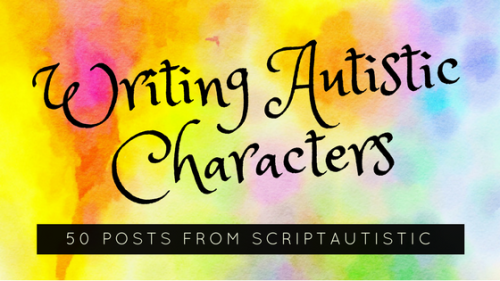

Writing Autistic Characters: 50 posts from scriptautistic
Happy Nanowrimo! In honour of national novel writing month 2017 we have put together this list of 50 of the most useful questions and answers from our blog this year. We hope you find them useful - happy writing!
-the scriptautistic mods
Meta
Our masterpost list
Finding an autistic sensitivity reader or beta-reader for your story
How to research autism without falling for tropes
How do I incorporate a character being autistic into the plot without making it be about them being autistic?
Autism resources
Representation
What sorts of characters would you like to see more of?
What are common stereotypes about autistic characters?
Do you have any advice to keep from infantilizing an autistic character?
Is it ok to write ASD characters that are not loved and accepted straight away?
Would it be bad if I make a non-human character autistic?
How do y'all feel about a story about an autistic guy who grows to dislike his autism?
Comorbidities
Similarities and differences between OCD and ASD
What is the difference between down syndrome and autism?
Encouraging abused children to stim again (effects of child abuse)
Are autistic people more likely to get migraines?
Tips for writing an autistic character in a psychiatric hospital?
The effect of a mental breakdown on a character’s routines
Emotions and empathy
What does hyperempathy feel like?
What would a low-empathy character feel and do when trying to comfort someone?
Showing love without saying “I love you”
How would my character use facial expressions?
Sensory sensitivities
What does understimulation feel like?
How might a person with sensory sensitivities cope with living in an unpleasant environment?
Can a character’s autistic traits change as they get older?
How does it feel to have auditory processing disorder?
Why would an autistic person might hit their head when overloaded?
Stimming
How can I write stims?
What does stimming feel like?
What unobtrusive stims could my character use?
Would a character stim differently depending on their emotions?
What is the effect of repressing their stims?
Education
Does autism give disadvantages for certain subjects at school?
Is it realistic to send someone with autism to a special needs school?
Ableism
Well-intentioned but rude neurotypical people
Bad therapy
Might a police officer consider an autistic person a threat if they were having a meltdown?
Communication
What might cause my character to be temporarily nonverbal?
What are some causes for an autistic person being nonverbal?
Might my character use filler words like “um” and “er”?
Could an autistic character pick up on sarcasm?
Could you use signing to communicate with an autistic toddler?
Other
Is it possible for a character’s family/friends to not suspect that the character is autistic until adulthood?
A character’s friends asking them to stop infodumping
How to write a sex scene with an autistic character
What problems might my character have around keeping a pet?
What could be some difficulties with being an autistic cop?
Flying and being at the airport while autistic
Fun posts
Stim toys in a post-apocalyptic setting
Accommodations for an autistic crewmember on a space station
What might an autistic society look like?
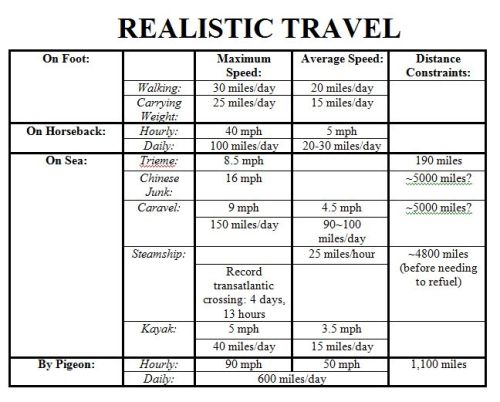
Here’s an invaluable writing resource for you.
Words to replace said, except this actually helps
I got pretty fed up with looking for words to replace said because they weren’t sorted in a way I could easily use/find them for the right time. So I did some myself.
IN RESPONSE TO Acknowledged Answered Protested
INPUT/JOIN CONVERSATION/ASK Added Implored Inquired Insisted Proposed Queried Questioned Recommended Testified
GUILTY/RELUCTANCE/SORRY Admitted Apologized Conceded Confessed Professed
FOR SOMEONE ELSE Advised Criticized Suggested
JUST CHECKING Affirmed Agreed Alleged Confirmed
LOUD Announced Chanted Crowed
LEWD/CUTE/SECRET SPY FEEL Appealed Disclosed Moaned
ANGRY FUCK OFF MATE WANNA FIGHT Argued Barked Challenged Cursed Fumed Growled Hissed Roared Swore
SMARTASS Articulated Asserted Assured Avowed Claimed Commanded Cross-examined Demanded Digressed Directed Foretold Instructed Interrupted Predicted Proclaimed Quoted Theorized
ASSHOLE Bellowed Boasted Bragged
NERVOUS TRAINWRECK Babbled Bawled Mumbled Sputtered Stammered Stuttered
SUAVE MOTHERFUCKER Bargained Divulged Disclosed Exhorted
FIRST OFF Began
LASTLY Concluded Concurred
WEAK PUSY Begged Blurted Complained Cried Faltered Fretted
HAPPY/LOL Cajoled Exclaimed Gushed Jested Joked Laughed
WEIRDLY HAPPY/EXCITED Extolled Jabbered Raved
BRUH, CHILL Cautioned Warned
ACTUALLY, YOU’RE WRONG Chided Contended Corrected Countered Debated Elaborated Objected Ranted Retorted
CHILL SAVAGE Commented Continued Observed Surmised
LISTEN BUDDY Enunciated Explained Elaborated Hinted Implied Lectured Reiterated Recited Reminded Stressed
BRUH I NEED U AND U NEED ME Confided Offered Urged
FINE Consented Decided
TOO EMO FULL OF EMOTIONS Croaked Lamented Pledged Sobbed Sympathized Wailed Whimpered
JUST SAYING Declared Decreed Mentioned Noted Pointed out Postulated Speculated Stated Told Vouched
WASN’T ME Denied Lied
EVIL SMARTASS Dictated Equivocated Ordered Reprimanded Threatened
BORED Droned Sighed
SHHHH IT’S QUIET TIME Echoed Mumbled Murmured Muttered Uttered Whispered
DRAMA QUEEN Exaggerated Panted Pleaded Prayed Preached
OH SHIT Gasped Marveled Screamed Screeched Shouted Shrieked Yelped Yelled
ANNOYED Grumbled Grunted Jeered Quipped Scolded Snapped Snarled Sneered
ANNOYING Nagged
I DON’T REALLY CARE BUT WHATEVER Guessed Ventured
I’M DRUNK OR JUST BEING WEIRDLY EXPRESSIVE FOR A POINT/SARCASM Hooted Howled Yowled
I WONDER Pondered Voiced Wondered
OH, YEAH, WHOOPS Recalled Recited Remembered
SURPRISE BITCH Revealed
IT SEEMS FAKE BUT OKAY/HA ACTUALLY FUNNY BUT I DON’T WANT TO LAUGH OUT LOUD Scoffed Snickered Snorted
BITCHY Tattled Taunted Teased
How could one play a manipulative character?
Me trying to figure out the distance between places and how long it’ll take a character to get there in a society that travels mostly on foot:

tip for adhd writers:
everyone will tell you to outline, to anaylze every personality trait of your characters and plan every plot point, but the truth? don’t. not only does it waste precious spurts of motivation, but it makes it less enjoyable. and what happens when adhders don’t enjoy something? we lack the motivation and focus needed for it.
i used to write, 24/7, and i developed my characters with vague ideas until they became fleshed out in the story without any extra manipulation and extensive notes. looking back on my old writing, these were the best characters I have ever written.
and then i stopped, and i spent months mapping out my characters to an exact t because I thought it would be better, but when i went to write, it was really hard. it seemed more like a chore. and because i had already planned their attitudes and perceptions, it was almost impossible for me to change anything without worrying about my endless sheets of character analysis.
just write. seriously. you can learn about your characters as the story goes. and then you can edit after. then you can add details and take things out while still having the fun story you enjoyed from the start.
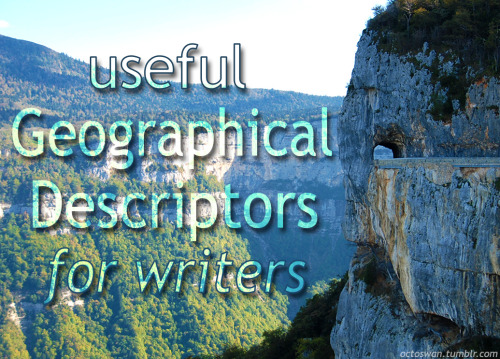


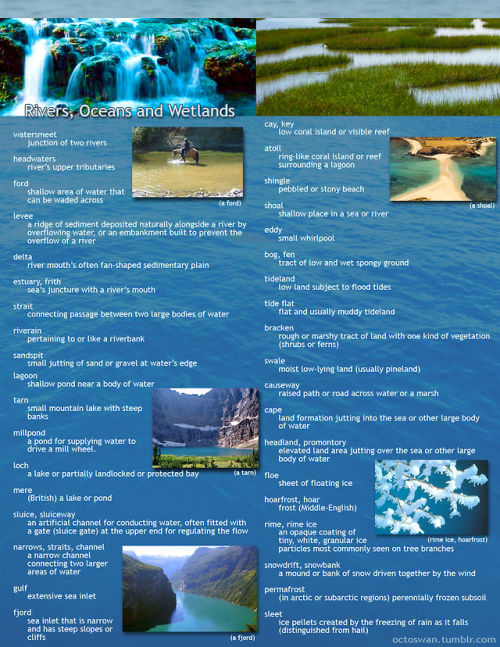
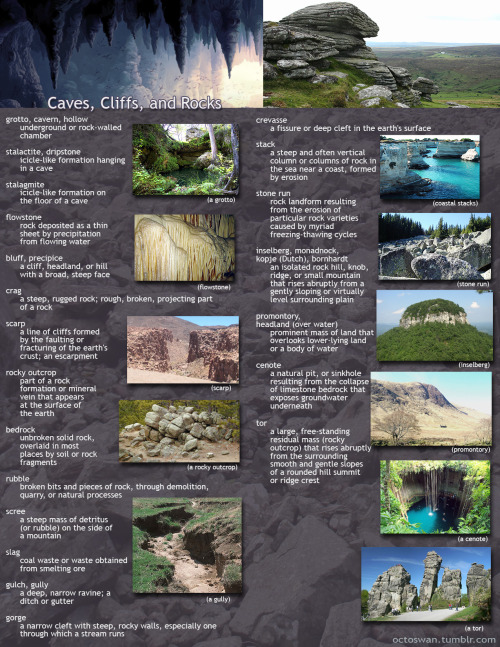
I made these as a way to compile all the geographical vocabulary that I thought was useful and interesting for writers. Some descriptors share categories, and some are simplified, but for the most part everything is in its proper place. Not all the words are as useable as others, and some might take tricky wording to pull off, but I hope these prove useful to all you writers out there!
(save the images to zoom in on the pics)
every writing tip article and their mother: dont ever use adverbs ever!
me, shoveling more adverbs onto the page because i do what i want: just you fucking try and stop me
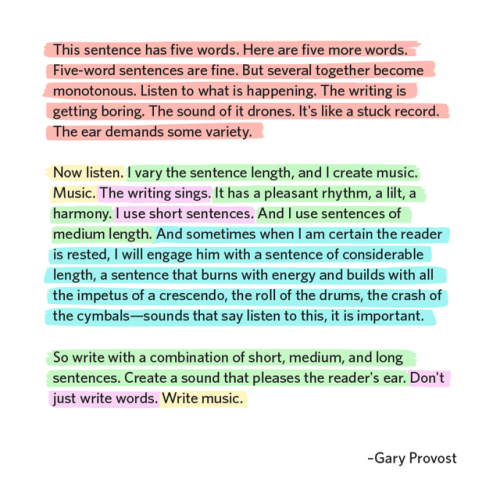
Seven years after, I see you again 😚
wear a different perfume when you commit murder fuckin amateurs
Make your deaths mean something
I was beta reading a book for a friend from the NaNo group where I live and during a certain part of the book, I sensed that someone in the story was going to die. I’d never read anything by her, so I wasn’t sure what to expect from the immanent death and it made me a bit nervous. (I even messaged her on Facebook to tell her that I would be disappointed if she “Romeo and Juliette-ed” the story.
After finishing the story, I thought it would be a good idea to write a bit about using death in your stories. What kinds of pitfalls you might encounter and how it can help your story grow.
Fiction vs Reality
Death is a fact of life. I’m sure you’ve heard this quote from Ben Franklin: “in this world nothing can be said to be certain, except death and taxes.”
It has become a bit cliche, but that doesn’t change the truth in the quote. If you ignore the revolving door of certain fictional characters, everyone is going to die.
In fiction, death is less permanent. Harry Potter (and Voldemort for that matter) died at some point in the novels. Jean Grey and death are old friends that visit from time to time. (Although Magneto has been dead more times.)
So what does this mean for your story? Here are a few suggestions:
Death has an impact on your story and the characters in your story. Do not treat a death lightly.
How will your characters grow because of this death?
How will it change the message of your story?
Ask yourself why, in the structure of your story, the character has to die.
Let’s consider a popular fictional death-Gandalf the Grey.
Gandalf is the leader of the company because of his knowledge Middle Earth. He has long wandered the highways and byways of the world and knows many of the secret places. When he leads the company to the mines of Moira, it is because the path is secret and will hide them from prying eyes.
The problem the story encounters is that Gandalf has become a crutch to the story. If he remains, then every problem can and will be solved by him. No one will grow, and the story will stagnate.
Gandalf’s death brings about many changes. Here are a few of them:
Boromir has a motive to lose faith in the company’s ability to bring the ring to Mordor.
Aragorn has to take charge of the company.
Frodo realizes that he is endangering the rest of the company.
Gandalf’s death is the catalyst for all of the action that takes place afterwards.
What purpose does death serve in a story?
Gandalf is just one example of a death in a story, and death can serve many purposes in a narrative.Let’s consider some of the ways that death can have an impact on your narrative:
Bring change to your living characters-Sometimes your characters need something to motivate them to change their lives. Death can be such a factor. Perhaps your character will decide the death is a reason to change their habits or lifestyle.
Create an emotional impact-Most of your readers will have experienced death in their lives, and these experiences cause some sort of emotional response.
Make the story longer by making it harder to accomplish the goal-What if the death is of a key character for the goal your characters are trying to accomplish? That can add to your word count as they strive to overcome this sudden lack.
Create an atmosphere-Especially if you are working in a genre such as horror, incorporating death in the story can create or enhance an aura of dread to your tale.
Accelerate the pace of the story-Death can make the elements of your story move more quickly, especially if the characters that are still alive feel a sense of immediacy.
Cause change for the sake of change- This is seen quite often during National Novel Writing Month in the form of the Traveling Shovel of Death. Killing off a character can bring about a wide variety of new dynamics in your story, but I wouldn’t recommend using it just because you don’t know what else to do.
Because art reflects life, and sometimes people die in real life- We already mentioned that death is a part of life, and sometimes death just happens, but make sure you understand how it will impact your story before you jump into it.
In order to un-kill them later/have a surprise return-This one is easy to abuse. Sure it can add to your story, but don’t do it too much.
Fulfilling revenge/just desserts- Sometimes your story just needs some payback, so why not let your character just go for it?
Demonstrate the severity of a situation- Think about every ‘bad guy’ scene in a movie. What does the bad guy do to prove just how bad he is? He shoots somebody. It may not always be fatal, but it proves a point.
Make a plan fail- Think back to Gandalf. His death upset the plan for the company to travel to Mount Doom together. This makes the story change direction.
Avoid cliches
Let’s take a moment to talk about cliches. Cliches are everywhere, and there are more of them every day. So how did cliches get to be so cliche in the first place?
A cliche is kind of like peer pressure-Everybody’s doing it. That’s how it became a cliche. In fact, every cliche was once an original idea, and everybody loved it. Just think, there was once a movie audience that had never seen any of the horror cliches, and they were amazed and shocked by the jump scares, and other overdone tricks that we groan about.
The problem with originality is that after someone sees it and wants to use it for their own project, there’s the danger of everyone wants to try it too. Before long, that unique take on the world has become overdone and boring.
What’s worse is that people are going to forget who had the original idea. If you look at the Lord of the Rings, it’s just like so much of the fantasy stories out there these days, but don’t forget that Tolkein wrote his books when the world of fantasy was young.
So what does that have to do with death in your story anyway?
Common Death Cliches
Coming back from the dead- This is a huge thing in comic books, but that is a different kind of medium and comic book companies depend on those big name characters to draw in readers, but that isn’t your book. Your story needs a sense of permanence. So when death happens, only take it back if it serves a purpose in the story.
I’m Not Dead Yet- We see this in every horror movie. the monster isn’t really dead yet. The fine fellows from Monty Python made a great scene where they spoofed this idea with the Black Knight. Even after he was only standing on one leg with no arms, he was still hopping around trying to kill Arthur.
Killing a character because you don’t know what else to do- Sure you need to introduce some change into your story, but death isn’t always the answer.
Getting rid of a character that doesn’t fit into your story- Better ways to get rid of that character include, but are not limited to: moving, getting lost, being kidnapped, alien abducted, you get the idea.
Hopefully that gives you some food for thought about death. (Yes, I am well aware that ‘food for thought’ is a cliche, but I wanted to check if you were paying attention.)
If you have other questions, let us know, and feel free to give us some feedback on the post.
Billy
This also has an etymology feature, so if you’re like me and need to find if a word existed in the time era you’re writing, Merriam-Webster is also helpful for that.
i just found out merriam webster has a time traveler feature that tells you some of the words that were “born” the same year as you. it’s pretty neat yall should do this